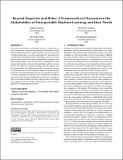Beyond Expertise and Roles: A Framework to Characterize the Stakeholders of Interpretable Machine Learning and their Needs
Author(s)
Suresh, Harini; Gomez, Steven R; Nam, Kevin K; Satyanarayan, Arvind
DownloadPublished version (1.961Mb)
Publisher with Creative Commons License
Publisher with Creative Commons License
Creative Commons Attribution
Terms of use
Metadata
Show full item recordAbstract
To ensure accountability and mitigate harm, it is critical that diverse
stakeholders can interrogate black-box automated systems and find information
that is understandable, relevant, and useful to them. In this paper, we eschew
prior expertise- and role-based categorizations of interpretability
stakeholders in favor of a more granular framework that decouples stakeholders'
knowledge from their interpretability needs. We characterize stakeholders by
their formal, instrumental, and personal knowledge and how it manifests in the
contexts of machine learning, the data domain, and the general milieu. We
additionally distill a hierarchical typology of stakeholder needs that
distinguishes higher-level domain goals from lower-level interpretability
tasks. In assessing the descriptive, evaluative, and generative powers of our
framework, we find our more nuanced treatment of stakeholders reveals gaps and
opportunities in the interpretability literature, adds precision to the design
and comparison of user studies, and facilitates a more reflexive approach to
conducting this research.
Date issued
2021Department
Massachusetts Institute of Technology. Computer Science and Artificial Intelligence Laboratory; Lincoln Laboratory; Massachusetts Institute of Technology. Department of Electrical Engineering and Computer ScienceJournal
Proceedings of the 2021 CHI Conference on Human Factors in Computing Systems
Publisher
Association for Computing Machinery (ACM)
Citation
Suresh, Harini, Gomez, Steven R, Nam, Kevin K and Satyanarayan, Arvind. 2021. "Beyond Expertise and Roles: A Framework to Characterize the Stakeholders of Interpretable Machine Learning and their Needs." Proceedings of the 2021 CHI Conference on Human Factors in Computing Systems.
Version: Final published version